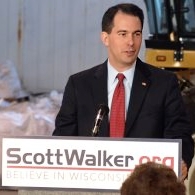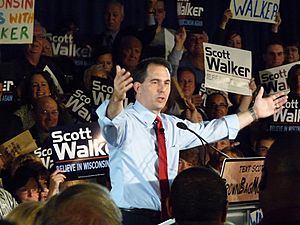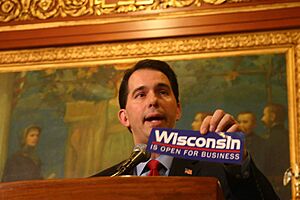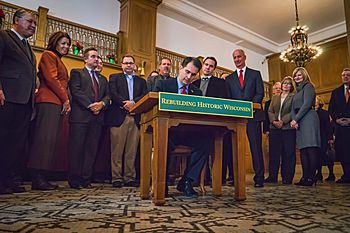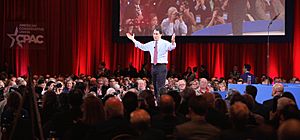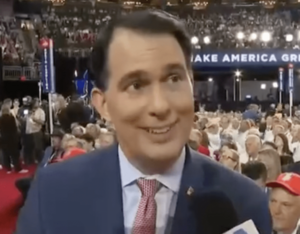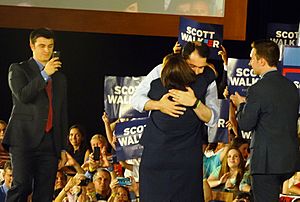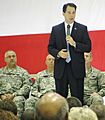Scott Walker (politician) facts for kids
Quick facts for kids
Scott Walker
|
|
|---|---|
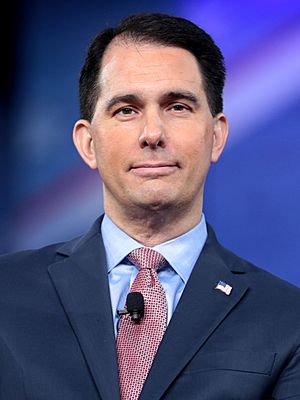
Walker in 2017
|
|
| 45th Governor of Wisconsin | |
| In office January 3, 2011 – January 7, 2019 |
|
| Lieutenant | Rebecca Kleefisch |
| Preceded by | Jim Doyle |
| Succeeded by | Tony Evers |
| Chair of the Republican Governors Association | |
| In office November 16, 2016 – November 17, 2017 |
|
| Preceded by | Susana Martinez |
| Succeeded by | Bill Haslam |
| 5th Executive of Milwaukee County | |
| In office April 30, 2002 – December 27, 2010 |
|
| Preceded by | Janine Geske (acting) |
| Succeeded by | Lee Holloway (acting) |
| Member of the Wisconsin State Assembly from the 14th district |
|
| In office June 30, 1993 – April 30, 2002 |
|
| Preceded by | Peggy Rosenzweig |
| Succeeded by | Leah Vukmir |
| Personal details | |
| Born |
Scott Kevin Walker
November 2, 1967 Colorado Springs, Colorado, U.S. |
| Political party | Republican |
| Spouse |
Tonette Tarantino
(m. 1993) |
| Children | 2 |
| Education | Marquette University (attended) |
| Signature |  |
Scott Kevin Walker (born November 2, 1967) is an American politician who was the 45th governor of Wisconsin from 2011 to 2019. He is a member of the Republican Party. Before becoming governor, he was the Milwaukee County executive from 2002 to 2010.
Walker was born in Colorado but grew up in Iowa and Wisconsin. He was elected to the Wisconsin State Assembly in 1993. In 2010, he won the election for governor. As governor, he became known for a law called the Wisconsin Budget Repair Bill. This law changed the rules for collective bargaining (a process where groups of workers negotiate with their employers) for most public workers.
This law led to large protests and an attempt to remove him from office in a special "recall" election in 2012. Walker won the recall election, becoming the first U.S. governor to do so. He was re-elected in 2014. In 2015, he ran for the Republican nomination for president but ended his campaign after a few months. He lost his race for a third term as governor in 2018 to Tony Evers. Since 2021, Walker has been the president of the Young America's Foundation, a conservative youth group.
Contents
Early Life and Education
Scott Walker was born in Colorado Springs, Colorado. His father was a Baptist minister, and his mother was a bookkeeper. His family moved to Plainfield, Iowa, and later to Delavan, Wisconsin.
In high school, Walker participated in programs that taught him about government and leadership. He even got to meet President Ronald Reagan. This experience sparked his interest in politics. He also earned the rank of Eagle Scout in the Boy Scouts of America.
After graduating from high school in 1986, Walker went to Marquette University. He was active in student government and volunteered for political campaigns. He left college in 1990 before graduating to take a full-time job with the American Red Cross.
Early Political Career
Wisconsin State Assembly
In 1993, at age 25, Walker won a special election to the Wisconsin State Assembly. He represented a district near Milwaukee. In the Assembly, he focused on issues like criminal justice and government spending. He supported ideas like welfare reform and was known for his conservative views. He served in the Assembly for four terms until 2002.
Milwaukee County Executive
In 2002, Walker was elected as the county executive of Milwaukee County. He was the first Republican to ever hold this job. He promised to be careful with the county's money.
During his eight years as executive, he worked to reduce the county's debt. He cut the number of county employees and vetoed spending he thought was unnecessary. He was re-elected in 2004 and 2008.
While he was county executive, an investigation looked into money that was missing from a veterans' charity. Some people who worked for Walker were found to be involved in misusing funds. Walker himself was not charged with any wrongdoing.
Governor of Wisconsin
Elections
Walker first ran for governor in 2006 but dropped out of the race. He ran again in 2010 and won the election. His campaign focused on creating jobs and cutting taxes. He also said he would oppose a plan to build a high-speed train line between Madison and Milwaukee. On November 2, 2010, his 43rd birthday, he defeated Democrat Tom Barrett to become governor.
2012 Recall Election
Soon after Walker became governor, he introduced a law that limited the power of public employee unions. This caused huge protests at the state capitol. Opponents gathered enough signatures to force a special election to try and remove him from office. This is called a recall election.
The recall election in June 2012 received national attention. Walker raised a lot of money for his campaign, much of it from outside Wisconsin. He faced Tom Barrett again and won with 53% of the vote. He became the first governor in U.S. history to survive a recall election.
Later Elections
Walker won re-election in 2014, defeating Democrat Mary Burke. In 2018, he ran for a third term but was narrowly defeated by Democrat Tony Evers.
First Term as Governor
When Walker took office, Wisconsin had a large budget deficit, meaning the state was spending more money than it had. One of his first major actions was introducing the 2011 Wisconsin Budget Repair Bill, also known as Act 10.
The 2011 Budget Repair Bill
This bill was Walker's plan to fix the state's budget problems. It required most public employees, like teachers and state workers, to pay more for their health insurance and pensions.
The most controversial part of the bill greatly limited collective bargaining rights for these workers. This meant their unions could no longer negotiate over things like benefits and working conditions. Police and firefighters were mostly exempt from these changes.
Walker said the law was needed to balance the budget and save jobs. Opponents said it was an attack on workers' rights. The bill led to weeks of protests, with thousands of people gathering at the Wisconsin State Capitol. To try and stop the bill, all 14 Democratic state senators left Wisconsin to prevent a vote. However, Republicans found a way to pass the bill, and Walker signed it into law in March 2011.
Other First-Term Actions
- Voter ID Law: In 2011, Walker signed a law requiring voters to show a photo ID at the polls. This law was challenged in court for several years.
- Health Care: Walker opposed the Patient Protection and Affordable Care Act (often called Obamacare). He rejected federal money to set up a state health insurance marketplace and to expand the state's Medicaid program.
- Education: Walker's first budget included cuts to public school funding. He also signed a law that created a new system for evaluating teachers.
Second Term as Governor
After being re-elected in 2014, Walker continued to focus on conservative policies.
Right-to-Work Law
In 2015, Walker signed a right-to-work law. This law says that private-sector workers cannot be required to join a union or pay union fees as a condition of their employment. Walker had previously said this was not a priority, but he signed the bill after the state legislature passed it.
University of Wisconsin
Walker's 2015 budget proposed a large funding cut for the University of Wisconsin System. It also tried to change the university's mission statement, known as the Wisconsin Idea. The original mission included the "search for truth," but the proposed change focused on meeting "the state's workforce needs." After criticism, Walker said the change was a mistake.
Foxconn Agreement
In 2017, Walker announced a major deal with Foxconn, a large electronics company from Taiwan. The agreement was for Foxconn to build a huge factory in Wisconsin. In return, the state promised to give the company billions of dollars in tax credits and other benefits. The deal was praised by some for its promise to create thousands of jobs, but criticized by others for its high cost to taxpayers and its impact on the environment.
2016 Presidential Campaign
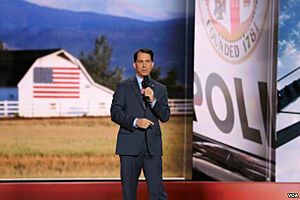
In early 2015, many people expected Walker to run for president. He was popular with conservatives for his actions as governor. He officially announced his campaign for the Republican nomination in July 2015.
For a while, he was considered a top candidate. However, his support in the polls began to drop. After two debates where his performance was seen as weak, he struggled to raise money. In September 2015, after just over two months, Walker ended his campaign. He later supported Ted Cruz and then Donald Trump for president.
Life After Politics
After leaving the governor's office in 2019, Walker became involved with several conservative organizations. In 2021, he became the president of the Young America's Foundation, a group that promotes conservative ideas to students. He has said this role means he will not run for office again in the near future.
Personal Life
Walker is married to Tonette Walker. They have two sons, Alex and Matt. The family lives in Wauwatosa, Wisconsin. Walker is known for being a fan of motorcycles and owns a Harley Davidson.
In 2013, he co-wrote a book called Unintimidated, which tells the story of his fight over the budget repair bill and the recall election.
Electoral history
Governor of Wisconsin
| 2018 Wisconsin gubernatorial election | |||||
|---|---|---|---|---|---|
| Party | Candidate | Votes | % | ±% | |
| Democratic | Tony Evers | 1,324,307 | 49.54% | +2.95% | |
| Republican | Scott Walker (incumbent) | 1,295,080 | 48.44% | −3.82% | |
| Libertarian | Phil Anderson | 20,255 | 0.76% | N/A | |
| Independent | Maggie Turnbull | 18,884 | 0.71% | N/A | |
| Green | Michael White | 11,087 | 0.41% | N/A | |
| Independent | Arnie Enz | 2,745 | 0.10% | N/A | |
| N/A | Write-ins | 980 | 0.04% | -0.02% | |
| Total votes | 2,673,308 | 100.0% | N/A | ||
| Party | Candidate | Votes | % | |
|---|---|---|---|---|
| Republican | Scott Walker (incumbent) | 1,259,706 | 52.26 | |
| Democratic | Mary Burke | 1,122,913 | 46.59 | |
| Libertarian | Robert Burke | 18,720 | 0.78 | |
| Independent | Dennis Fehr | 7,530 | 0.31 | |
| Majority | 136,793 | 5.67% | ||
| Total votes | 2,410,314 | 100 | ||
| Party | Candidate | Votes | % | ||
|---|---|---|---|---|---|
| Republican | Scott Walker (incumbent) | 1,335,585 | 53.1 | ||
| Democratic | Tom Barrett | 1,164,480 | 46.3 | ||
| Independent | Hariprasad Trivedi | 14,463 | 0.6 | ||
| Total votes | 2,514,528 | 100.0 | |||
| Republican hold | |||||
| 2010 Wisconsin gubernatorial election | |||||
|---|---|---|---|---|---|
| Party | Candidate | Votes | % | ±% | |
| Republican | Scott Walker | 1,128,941 | 52.29% | +6.93% | |
| Democratic | Tom Barrett | 1,004,303 | 46.52% | −6.24% | |
| Independent | Jim Langer | 10,608 | 0.49% | ||
| Common Sense | James James | 8,273 | 0.38% | ||
| Libertarian | Terry Virgil | 6,790 | 0.31% | ||
| Write-ins | 59 | 0.00% | |||
| Majority | 124,638 | 5.77% | −1.62% | ||
| Turnout | 2,158,974 | ||||
| Republican gain from Democrat | Swing | ||||
Images for kids
See also
 In Spanish: Scott Walker (político) para niños
In Spanish: Scott Walker (político) para niños
 | DeHart Hubbard |
 | Wilma Rudolph |
 | Jesse Owens |
 | Jackie Joyner-Kersee |
 | Major Taylor |


